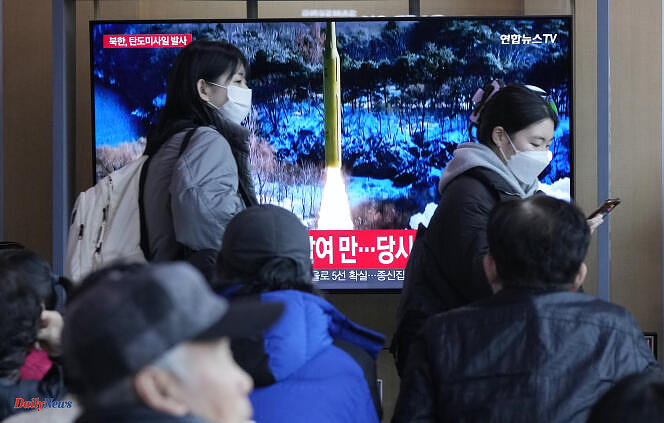North Korea launched several short-range ballistic missiles on Monday March 18, the Seoul army reported, during a visit by American Secretary of State Antony Blinken to South Korea.
The South Korean military said it “detected around 7:44 a.m. [22:44 GMT] the launch of what appears to be multiple short-range ballistic missiles,” which traveled some 300 kilometers before crashing into the East Sea, also known as the Sea of Japan.
“We share relevant information with the United States and Japan and stand ready to intervene,” added the Joint Chiefs of Staff.
The shootings coincide with the visit of the head of American diplomacy, who arrived the previous evening in Seoul. He met with South Korean President Yoon Suk Yeol on Monday morning, according to his entourage, and was participating in the third “Democracy Summit” on Monday. They also come a few days after the end of joint American-South Korean military exercises.
“These launches, like previous ballistic missile launches in recent years, are in violation of multiple UN Security Council resolutions,” said a spokesperson for the US State Department, emphasizing that these launches “ threaten” North Korea’s neighbors and “undermine regional security.” “Our commitment to the defense of Japan and South Korea remains unwavering,” the spokesperson added.
According to the Japanese press, three short-range ballistic missiles were fired, with Prime Minister Fumio Kishida condemning “repeated and very frequent” weapons tests by the North. This “series of actions threatens the peace and security of Japan, the region and the international community. We don’t tolerate it,” he added.
These ballistic missile launches are the second by Pyongyang in 2024, after that, on January 14, of a machine equipped with a hypersonic warhead.
Strengthening the alliance between Washington and Seoul
Mr. Blinken landed in South Korea on Sunday to participate in the third “Democracy Summit,” an initiative by United States President Joe Biden, which Seoul is hosting from Monday to Wednesday. Government officials, NGOs and members of civil society are present.
The American Secretary of State was also to discuss with his South Korean counterpart Cho Tae-yul a strengthening of the alliance between Washington and Seoul, as part of a policy of “extended deterrence” against the North.
On Thursday, Seoul and Washington ended their annual large-scale “Freedom Shield” exercises, including missile interception and air assaults. The number of troops participating has been doubled compared to 2023.
North Korean threats
Pyongyang warned in early March that the United States and South Korea would pay a “high price” for the maneuvers before announcing that North Korean leader Kim Jong-un had overseen a large-scale artillery exercise that included , according to him, border units “which put the enemy’s capital within their reach.”
“This is a very calculated maneuver on the part of Pyongyang, firing several missiles shows that it is capable of such an act even when the highest American diplomat is on site,” told Agence France -Press (AFP) Professor Choi Gi-il, specialist in military studies at Sangii University.
North Korea usually launches missiles "as a response" after joint exercises between the United States and South Korea, said Han Kwon-hee of the Korea Association of Industry Studies of the defense.
Seoul is a key ally of Washington in the region. The United States stations some 27,000 American troops in South Korea to help protect itself against the nuclear-armed North.
Coming to power in 2022, conservative South Korean President Yoon Suk Yeol has strengthened his ties with the White House and sought to get closer to Japan, a former colonial power on the Korean peninsula, in the face of threats from Pyongyang.
Since the start of the year, Pyongyang has designated Seoul as its “main enemy,” closed agencies dedicated to reunification and inter-Korean dialogue, and threatened war over any violation of its territory “even just of 0.001 millimeter”.
After Seoul, Antony Blinken must go to the Philippines, to provide support to an ally struggling with Beijing's desires in the South China Sea.












